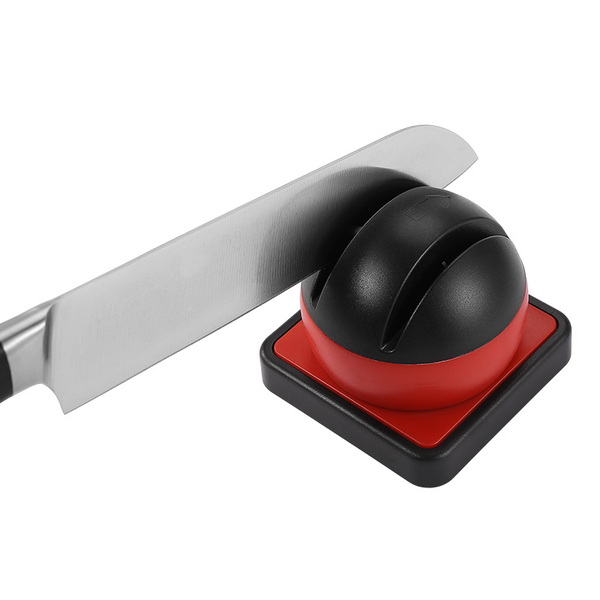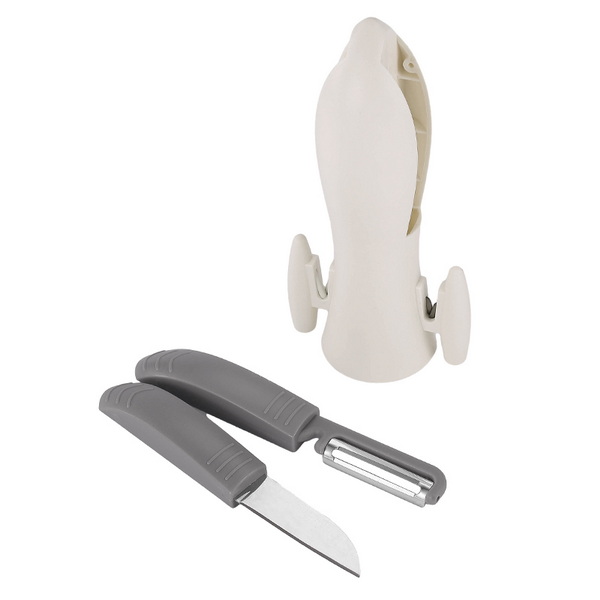

Views: 222 Author: Ella Publish Time: 2025-05-28 Origin: Site








Content Menu
● Understanding China Kitchen Knife Sharpeners
>> Types of China Kitchen Knife Sharpeners
● Compatibility with Different Knife Types
>> Western vs. Japanese Knives
● Performance and Quality of China Kitchen Knife Sharpeners
>> Advantages
>> Limitations
● How to Use a China Kitchen Knife Sharpener Effectively
>> General Tips
● Additional Maintenance Tips for China Kitchen Knife Sharpeners
● Benefits of Using China Kitchen Knife Sharpeners
● Limitations and Considerations
● Choosing the Right Sharpener for Your Needs
● FAQ
>> 1. Can a China kitchen knife sharpener sharpen Japanese knives effectively?
>> 2. Are China kitchen knife sharpeners suitable for ceramic knives?
>> 3. How often should I sharpen my knives with a China kitchen knife sharpener?
>> 4. What types of sharpening angles do China kitchen knife sharpeners support?
>> 5. Is it safe to use a China kitchen knife sharpener at home?
Maintaining sharp knives is essential for any kitchen, whether professional or home-based. A sharp blade not only makes cutting easier but also safer and more precise. Among the many options available, China kitchen knife sharpeners have gained popularity due to their affordability, variety, and innovative designs. But the question remains: Is a China knife sharpener good for all knife types? This article explores the performance, compatibility, and versatility of China kitchen knife sharpeners, helping you decide if they are the right choice for your knives.

China is a major hub for manufacturing kitchen tools, including knife sharpeners. These sharpeners come in various forms, such as manual handheld devices, electric sharpeners, multi-stage sharpeners, and specialty sharpeners designed for specific blade types. Chinese manufacturers produce sharpeners with ergonomic designs, diamond-coated wheels, ceramic rods, and compact sizes suitable for both professional chefs and home cooks.
- Manual Sharpeners: These include handheld sharpeners with tungsten steel rods, diamond-coated surfaces, or ceramic rods. They are portable and easy to use.
- Electric Sharpeners: Automated devices that offer quick and consistent sharpening with multiple stages.
- Multi-Stage Sharpeners: Devices that provide coarse, medium, and fine sharpening stages for precision.
- Specialty Sharpeners: Designed for ceramic knives, scissors, or outdoor tools.
The effectiveness of a China kitchen knife sharpener depends largely on the type of knife being sharpened. Knives vary in blade material, hardness, and edge geometry, which affects how they should be sharpened.
- Western knives are typically made from softer steel and have a more robust edge angle (usually around 20°). They respond well to pull-through sharpeners and honing steels, which are common in Chinese-made sharpeners.
- Japanese knives often have harder steel and a sharper edge angle (around 15°). They require more delicate sharpening to avoid chipping. Sharpening steels are generally not recommended for Japanese knives because their hard steel can chip.
- Ceramic knives require diamond abrasives due to their hardness but are not magnetic, which limits compatibility with some magnetic-based sharpeners.
- Damascus steel knives can be sharpened effectively with diamond-coated wheels found in many Chinese sharpeners, as diamond is harder than Damascus steel.
- Serrated knives often require specialized sharpeners or manual sharpening techniques to maintain their edges properly.
China kitchen knife sharpeners offer a wide range of quality levels, from budget-friendly models to advanced sharpeners with precision engineering.
- Cost-Effective: Chinese sharpeners are often more affordable than Western brands, making them accessible to a wide range of users.
- Variety: The large manufacturing base in China means a broad selection of sharpeners for different needs and budgets.
- Innovative Features: Many sharpeners include diamond-coated wheels, ergonomic handles, non-slip bases, and multi-stage sharpening options.
- Customization: OEM and ODM services allow for tailored designs and packaging to meet specific market demands.
- Metal Removal: Some pull-through and electric sharpeners remove more metal than necessary, potentially shortening the lifespan of knives if overused.
- Angle Limitations: Certain sharpeners offer fixed sharpening angles (e.g., 15° or 20°), which may not suit all knives, especially those requiring finer or wider angles.
- Not Ideal for All Blades: Some sharpeners are not suitable for very curved blades or ceramic knives due to design constraints.

Using a China kitchen knife sharpener properly is key to getting the best results and prolonging the life of your knives.
- Choose the Right Sharpener: Match the sharpener type to your knife's blade material and shape.
- Maintain Correct Angle: Many sharpeners have guides; if not, aim for the recommended angle (15°-20° depending on knife type).
- Use Multiple Stages: Start with coarse sharpening to repair dull or damaged edges, then use finer stages for honing and polishing.
- Avoid Excessive Pressure: Let the sharpener do the work to prevent blade damage or uneven sharpening.
- Regular Maintenance: Hone your knives regularly and sharpen only when necessary to maintain sharpness without excessive wear.
Proper maintenance of your China kitchen knife sharpener is essential to ensure its longevity and consistent performance. Regular cleaning of the sharpening surfaces, whether diamond-coated wheels or ceramic rods, prevents metal filings and debris from accumulating and affecting sharpening quality. Use a soft brush or cloth to clean the sharpener after each use.
Store your sharpener in a dry place to avoid rust or corrosion, especially for manual sharpeners with steel components. Avoid dropping or banging the sharpener, as this can damage the alignment of sharpening surfaces.
- Accessibility: These sharpeners are widely available and affordable, making them accessible to a broad audience.
- User-Friendly: Many models are designed with beginners in mind, featuring angle guides and ergonomic handles.
- Versatility: Suitable for a variety of knives, including kitchen, outdoor, and utility knives.
- Compact and Portable: Many Chinese sharpeners are designed to be compact, making them easy to store and transport.
- Quick Results: Electric and multi-stage sharpeners provide efficient sharpening, saving time in busy kitchens.
While China kitchen knife sharpeners offer many advantages, users should be aware of certain limitations:
- Quality Variability: The quality can vary significantly between models and manufacturers, so it is important to choose reputable brands.
- Angle Restrictions: Fixed-angle sharpeners may not suit all knife types, especially those requiring custom angles.
- Potential Over-Sharpening: Without proper technique, users may remove too much metal, shortening the knife's lifespan.
- Not Always Suitable for Specialty Knives: Some sharpeners may not accommodate very curved blades or knives with unusual edge profiles.
- Durability Concerns: Lower-end models may have components that wear out faster, requiring replacement or repair.
When selecting a China kitchen knife sharpener, consider the types of knives you own, your sharpening experience, and your budget. For beginners, a simple manual sharpener with angle guides may be ideal. Experienced users might prefer multi-stage or electric sharpeners with adjustable angles. If you have specialty knives like ceramic or serrated blades, look for sharpeners specifically designed for those.
China kitchen knife sharpeners are generally good for a wide range of knife types, especially Western-style kitchen knives made from softer steels. They offer excellent value, variety, and innovative features that appeal to both home cooks and professionals. However, their suitability for all knife types depends on the sharpener's design and the blade's material and geometry. Japanese knives, ceramic blades, and highly specialized knives may require more precise or specialized sharpening tools.
When used properly, a China kitchen knife sharpener can restore dull blades efficiently and safely. To maximize their effectiveness, choose the right sharpener for your knives, maintain the correct sharpening angle, and avoid over-sharpening to prolong your knives' lifespan. With proper care and technique, these sharpeners can be a reliable and cost-effective tool in your kitchen arsenal.

China kitchen knife sharpeners can sharpen Japanese knives, but caution is needed. Japanese knives have harder, more brittle steel and sharper angles, so sharpeners with adjustable angles or finer abrasives are preferable to avoid chipping.
Most China kitchen knife sharpeners with diamond-coated wheels can sharpen ceramic knives, but magnetic holders or certain manual sharpeners may not work due to ceramic's non-magnetic nature.
Sharpen knives only when they become noticeably dull. Regular honing can maintain the edge between sharpening sessions. Over-sharpening can reduce the knife's lifespan.
Many sharpeners offer preset angles, commonly 15° and 20°, suitable for most Western and Asian knives. Some advanced models allow angle customization for specific blade types.
Yes, most China kitchen knife sharpeners are designed with safety features like non-slip bases and ergonomic handles. Always follow the manufacturer's instructions and use proper technique to avoid injury.